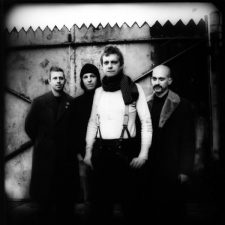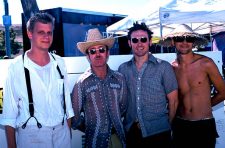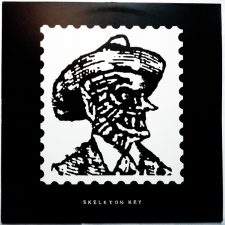Presenting archival material from MusicTAP’s history, this interview, conducted in 2004, features the mastermind of the indie rock band Skeleton Key, Erik Sanko. Since this interview, Sanko has been involved with other ventures, both in music and otherwise.
Skeleton Key released the album Gravity Is The Enemy in 2012.
This interview is presented as was originally published.
__________________________
 Rock music used to be interesting and sometimes it still is… You just have to search a little harder. Take, for instance, Skeleton Key whose 2002 release Obtanuim mixed charged-up guitars, junkyard percussion and a twisted lyrical sensibility into an album that always intrigues and never sounds like anyone else you’ve heard.
Rock music used to be interesting and sometimes it still is… You just have to search a little harder. Take, for instance, Skeleton Key whose 2002 release Obtanuim mixed charged-up guitars, junkyard percussion and a twisted lyrical sensibility into an album that always intrigues and never sounds like anyone else you’ve heard.
MusicTAP was fortunate enough to snag some time with the band’s ringleader Erik Sanko to talk about the past, present, and future of one of music’s most underrated rock bands.
MUSICTAP (Dw Dunphy) – What’s the current status with you and/or the band? It’s been two years since “Obtanium” and the fans are itching.
ERIK SANKO – We’re now a lean, mean touring machine. We’re ambassadors and missionaries of our own delightfully cryptic version of subterranean New York rock. We’re like medieval Crusaders, minus the torture part.
MT – How did Skeleton Key come to be on Ipecac?
ES – We were introduced to them through our old friends The Melvins.
 MT – There have been several key member changes since the band began and recorded the Motel Records E.P. How has that influenced the band dynamic and the writing process, or has it at all?
MT – There have been several key member changes since the band began and recorded the Motel Records E.P. How has that influenced the band dynamic and the writing process, or has it at all?
ES – The way the band works now is in much more of a graceful, organic process, as opposed to one built from friction and pressure. Diamonds are made from friction and pressure, but so is high blood pressure.
MT – What was your involvement with The Lounge Lizards (the group most commonly referenced with John Lurie)? I’d imagine it was much different than that of Skeleton Key.
ES – I was the bass player and co-writer from 1984 until about 2001 when the band sadly folded. It was a different experience than that of Skeleton Key but not as different as one might think. I joined the Lizards when I was 19 years old so John was like a father to me, or more appropriately like a really weird uncle that nobody talked about. Much of the way Skeleton Key works was inspired by the way John and I worked on music. He was never afraid to say something like “This should be really precious and vulnerable” or “naive and playful” or “garish and ugly”, depending on what the musical circumstances required. However, these are concepts that aren’t bandied about too liberally in the rock world. We treat the songs like they want to be treated. One may want to be a bank president but another may want to sit in the corner and stick crayons up its nose.
MT – I’ve always enjoyed the fact that Skeleton Key could go from something rather straightforward like “King Know It All” to something very left-of-center like “The Barker Of The Dupes” or funky like “Of All The Things I’ve Lost (I Miss You The Most)”. What influences Erik Sanko musically to have such a wide range?
ES – I was raised in a musical community where the avant-garde and The Beatles were both in heavy rotation. I’m a fan of anything passionate and anything that has integrity. Those are the things I respond to. I like it when something is stimulating on an intellectual level, but not at the expense of the visceral level. I like it when something is completely exotic and unfamiliar but I like musical comfort food too. I don’t discriminate where it comes from, it’s all beautiful to me as long as it comes from an honest and sincere place. “Keep your ears open and your pie hole shut” I say “and you can’t go wrong.”
 MT – Even some big Key fans didn’t realize you had a solo disc out on Jetset Music (Tod A’s indie label), and “Past Imperfect, Present Tense” is, if I’m correct, all you. What was that like and was there a conscious decision to write those songs with the solo in mind, or was it a decision after the fact that they were just too intimate for a big band sound?
MT – Even some big Key fans didn’t realize you had a solo disc out on Jetset Music (Tod A’s indie label), and “Past Imperfect, Present Tense” is, if I’m correct, all you. What was that like and was there a conscious decision to write those songs with the solo in mind, or was it a decision after the fact that they were just too intimate for a big band sound?
ES – There was no conscious decision being made except to get through where I was at. That record was done during a rather stinky, emotionally pungent period in my life when I was alone and Skeleton Key was stuck in a legal circle jerk. The songs just sort of came out that way – very intimate and personal, very small. At the time, they seemed like they would’ve been dwarfed by the rest of Skeleton Key’s music but now it makes more sense to integrate them since Skeleton Key has never been defined by any particularly traditional boundaries. I’m actually starting a new solo record in conjunction with Andy Green whom I worked beside with John Cale the past ten years.
MT – My personal favorite off that disc was “That Train” which had, to me, a somewhat country/homespun feel to it. Intentional or am I being misled by the slidework?
ES – Thanks. That sounds good to me. Anything with a train involved has to have a slide too.
 MT – Your CD credits often thank Danny Elfman, and I can see some parallels there (an affinity for creative/bizarre percussion, a somewhat “Edward Gorey-like” bent to imagery). What’s the relationship there?
MT – Your CD credits often thank Danny Elfman, and I can see some parallels there (an affinity for creative/bizarre percussion, a somewhat “Edward Gorey-like” bent to imagery). What’s the relationship there?
ES – Danny is my best friend. We met about ten years ago through a guy we knew in common and never turned back. I was super nervous the first time he ever came over but about a half an hour later I think we realized that we were two versions of the same esoteric goofball.
MT – As alluded to in the last question, could you describe Skeleton Key’s unorthodox percussion for those who have never seen/heard it?
ES – We have two drummers, one of whom plays a fairly conventional drum kit and the other plays mostly garbage – pots and pans and pieces of found debris. It was the only way to achieve this horrible/wonderful sound rattling around in my head. I wanted it to sound like the film score to a freight train derailing.
 MT – There was a lot of excitement when the band was originally signed with Capitol, but unless you got the word of mouth on it, chances are it slipped right under the radar. Would you be able to tell what shook down, or is it just the usual big label hijinks?
MT – There was a lot of excitement when the band was originally signed with Capitol, but unless you got the word of mouth on it, chances are it slipped right under the radar. Would you be able to tell what shook down, or is it just the usual big label hijinks?
ES – We were dupes of hype like many other bands. The label probably never really had any intentions of doing anything with us but signing us was certainly a feather in their aesthetic cap.
MT – Where are you most comfortable; the studio or out playing live?
ES – I’m a big fan of both. They both scratch a different itch.
 MT – Lyrically, Skeleton Key tends to do it their own way. Technically, “Kerosene” is a pretty sexy song, but it is definitely couched in some rather unromantic visualizations. Do you set out to knock cliches like the “sexy song” on its ear or is it simply how you write?
MT – Lyrically, Skeleton Key tends to do it their own way. Technically, “Kerosene” is a pretty sexy song, but it is definitely couched in some rather unromantic visualizations. Do you set out to knock cliches like the “sexy song” on its ear or is it simply how you write?
ES – I’m afraid that’s just how my brain works. I have no beef with cliches – cliches become cliches for a reason. I don’t choose to use them personally because they are typically an overly simplified shortcut to an overly simplified situation and do not provide the most potent palette for making a point. If you have something to say, if you have the listener’s ear, don’t waste the opportunity. Say what you have to say as thoroughly and as thoughtfully that you can. “Kerosene” is about a relationship with a girl that I knew was volatile but intoxicating and kerosene seemed like a good metaphor- cooling and soothing on the surface, but add some friction and – BOOM! – potentially hazardous to the health!
MT – You’ve now produced discs for both big labels and independent labels. Is there that much of a difference between them in terms of finance and creative politics? Eli Janney’s work on “Fantastic Spikes Through Balloon” sets it apart a little because of his involvement with Girls Vs. Boys and Brainiac, but there’s still the assumed hierarchy of big label A&R…
ES – When we recorded our big fancy pants record, we were lucky enough to have had complete creative control over the process. I think everybody would admit that it would be a mistake to force fit this band into a pre-existing mold. Financially there is a HUGE difference. Capitol wouldn’t deal with anything- if there was an issue, they just threw money at it until the money ran out. Ipecac didn’t have any money to throw anywhere in our direction but they had a lot of heart.
 MT – The band has toured as part of Ipecac’s big packaged show, going out with Tomahawk, Melvins, Fantomas and (I think) Isis . That’s a rather bold cast of characters. What was it like, or did the bands keep to themselves and do their own thing?
MT – The band has toured as part of Ipecac’s big packaged show, going out with Tomahawk, Melvins, Fantomas and (I think) Isis . That’s a rather bold cast of characters. What was it like, or did the bands keep to themselves and do their own thing?
ES – No, no, no, not at all. We’ve all been friends for a long time- much camaraderie and hijinks afoot.
MT – Any wild performance stories or incidents you hope you’ll never experience again?
ES – While rocking for the good people of Seattle, I twisted my leg and tore a ligament in my knee. I
struggled through the set and went to the hospital afterward. That pretty well sucked.
 MT – It struck me that “One Way, My Way” is now more pointed and relevant than when it came out. To what extent do current events affect the writing process?
MT – It struck me that “One Way, My Way” is now more pointed and relevant than when it came out. To what extent do current events affect the writing process?
ES – We’re acutely aware of what’s going on in the world, I mean, we live six blocks away from the World Trade Center for cryin’ out loud. I’m personally not interested in writing specifically about politics, but I am interested in writing about what drives people to do what they’ do. I am currently writing another song about a privileged little rich kid and his sense of entitlement when it suddenly struck me that that rings a little familiar too!
MT – Typical cheesy interviewer question: you’re stranded on a desert island and you have to take along five things. They don’t have to be music related, but they have to be things you’d truly miss were you isolated for a long period of time (books, an item of great sentimental value, something necessary to pass the time or maintain sanity, etc.)
ES – Can I bring my wife? If I could bring my wife, would figure out the rest when we got there. What’s the view like?
 MT – When you’re behind the boards in the producer’s seat, do you prefer spontaneity or do you go to the other extreme? I find the band has the distinction of being both well-produced and not over-futzed-with…
MT – When you’re behind the boards in the producer’s seat, do you prefer spontaneity or do you go to the other extreme? I find the band has the distinction of being both well-produced and not over-futzed-with…
ES – Always start from the outside and reel it in when (or if) it’s necessary. It’s always better to overstate something than understate it because you’ll inevitably lose something in the translation to the relatively two-dimensional format of recording.
MT – Who is Anton Sanko? Have you worked with him on his film soundtracks?
ES – I’ve worked on a lot of things with Anton Sanko-learning how to ride a bike, shoelace tying etc. Anton is my older brother and the reason I ever started playing music at all. I was lucky enough to have a curious brother in an otherwise un-curious environment. He would go to the public library and take home the weirdest records he could lay his hands on. Some turned out to be nonsense but that’s also how we discovered The Mahavishnu Orchestra and Frank Zappa. To answer your question, I have indeed had the pleasure of working with him on some scores.
MT – What is important in the life of a musician, or any creative individual, in the public eye? Does he/she do it for his/herself, for the fans first, or is there a common ground where both give and take?
ES – To maintain one’s integrity. It has to start from a genuine, heartfelt, honest place. Nobody responds to bullshit for long. After that, it’s all gravy. This is an honor to do this for a living and I never take it for granted. Live your life with grace and dignity.
 MT – Do you see yourself in a different place in the future than you are now; different aspirations, goals? How far has Erik Sanko come?
MT – Do you see yourself in a different place in the future than you are now; different aspirations, goals? How far has Erik Sanko come?
ES – I used to be very calcified in my thinking and I started to become inflexible. When I met my wife she turned my head completely around and now I want to experience life all the time! I want to be more ambitious with what I do in all aspects of and live more fully. The world’s a big beautiful town and I’m on a bender!
MT – Open forum time: What is something that an interviewer has never asked that you wish they would, or is there a point you’d like to make, on any subject, that you haven’t had a chance to express (up to now, so take advantage of it)…
ES – Nobody has ever really made any reference to the lyrics before you! I secretly wished that somebody would notice them because I pour over them for so long I hoped it wasn’t for naught. I’m also happy you mentioned my brother.
MT – When again did you say the band would have a new release? (Hint, hint?)
ES – That’s a good question that I’m afraid I don’t have an answer for it. We have an entire record in the can but we are looking for a new deal. Why you got a record company?
Please visit www.skeletonkey.org for the latest Skeleton Key info.
Thanks to Erik Sanko for his time and generosity. A heads-up to enterprising labels: the gauntlet’s down now. Pick up this band or regret it when someone else does.